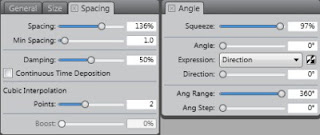Patterns, papers, and brushes in Painter
To make certain that a pattern has correct perspective, you will have to paint it by hand. But here are some techniques to make your life easier if perspective doesn't matter so much.
I then use the Pinch and Bulge brushes from F-X carefully to match the perspective.
Advantages: by adjusting the spacing or colours (or Color Variability > From Gradient) you can make many different versions of the pattern. You can use any brush type you are comfortable with.
Advantages: the Fill Bucket's great for fabric patterns or buildings. You can use the same pattern throughout a design.
Advantages: In gestural paintings, papers grant the hint of patterns without too much detail. Multicoloured patterns are easy to do; use Add Grain brush if overpainted.
Using Brushes as patterns
I arrange the brush settings like this:Advantages: by adjusting the spacing or colours (or Color Variability > From Gradient) you can make many different versions of the pattern. You can use any brush type you are comfortable with.
Using patterns as... well, patterns
You can capture anything as a pattern in the Pattern Panel. Patterns can be used with the Fill Bucket, Pattern Pens, and as Clone Source, making them quite versatile. Capture patterns intended for lace and such as masked patterns to preserve transparency. Painter handles making seamless tiles nicely under check out pattern.Advantages: the Fill Bucket's great for fabric patterns or buildings. You can use the same pattern throughout a design.
Using papers as patterns
Patterned papers bring texture into your painting, and with either the Add Grain brush from Photo or any brush with grain settings you can use them anywhere in the painting, without layer effects. With the grain setting, you can use different colours in one pattern. You need to create seamless tiles. Surface Effects > Express texture/Apply Surface Texture are more ways to intergrate papers.Advantages: In gestural paintings, papers grant the hint of patterns without too much detail. Multicoloured patterns are easy to do; use Add Grain brush if overpainted.







Comments
Post a Comment